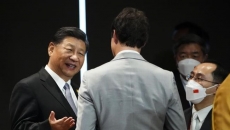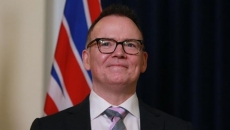OTTAWA - The federal government is facing questions about exactly what kind of force it is asking police to stop using, as the RCMP is criticized over its decision not to outlaw a controversial neck hold.
The RCMP says that it still allows officers to use the "carotid control" hold even though other forces, such as the Ontario Provincial Police, stopped using it three decades ago.
Public Safety Minister Marco Mendicino directed Commissioner Brenda Lucki to bar Mounties from using the method in a mandate letter last year.
The fact that he also asked RCMP to stop using two other tools — tear gas and rubber bullets — has received less public attention.
Western University criminologist Michael Arntfield said the letter caused confusion because by his description, those are "outmoded" methods no longer used by police in Canada. He is urging Mendicino to clarify whether he meant to ban alternatives that the RCMP does use.
"There needs to be more clarification on whether this is a game of semantics, or misunderstanding about what the contemporary police's less-lethal weapons arsenal would include," the former police officer said.
Arntfield said Mendicino either "doesn’t understand the distinction" or is trying to remove dated nomenclature from being used.
The RCMP refers to the gas used for riot control as CS gas, and Arntfield said it is less dangerous than the gas that police forces used for the same purpose in the past. Several compounds can be referred to as "tear gas," which is any aerosol that irritates the mucous membrane of the eyes.
But Arntfield said that police use the more-specific terminology to make the difference clear.
"Does he not know the difference? Because the law is all about wording," Arntfield said.
Mendicino's office said its expectation is that Lucki "remains committed to implementing these reforms" and that it would be seeking an update from the RCMP.
But it did not respond to questions about whether the minister intends to ban the CS gas and extended-range impact weapons, which use sponge rounds, that have come to replace the more-antiquated tools.
It is not clear whether the RCMP intends to follow Mendicino's direction.
"The RCMP is currently working with partners, stakeholders and bargaining agents in reviewing the mandate letter and its outlined commitments," a statement from the force said.
National Police Federation president Brian Sauvé said "perhaps there is a misunderstanding at the minister's office" about the use-of-force methods employed by the RCMP.
He said he is inviting Mendicino to learn more about the techniques and how they differ, and broadly questioned the minister's decision to weigh in on how the RCMP operates.
"Use-of-force policy should be the commissioner's purview, for operational independence," he said.
Sauvé and his organization, which represents almost 20,000 RCMP members, are asking Mendicino to revisit the decision to reduce the intervention options available to police.
Despite public attention and the call from Mendicino, the RCMP said its officers continue to use the "carotid control" hold under certain circumstances, including 25 times in 2020 and 14 times in 2021.
The hold came under intense scrutiny after the 2020 killing of George Floyd, who died when a Minneapolis police officer knelt on his neck for more than nine minutes.
The RCMP said that officer training limits the use of such techniques, and that they are rarely used. The force added that it has reviewed its use of the neck restraint and updated its policy on its use in November to give officers new guidance on how to use it, including the "risks of applying the technique on medically high-risk groups."
A paper published last fall in the Journal of Forensic and Legal Medicine said research on the subject is "scant," but the neck hold can be "safe and effective" during high-risk police encounters if it is performed by people who are properly trained. The RCMP participated in the study.
Arntfield said he is surprised its use is being defended by the RCMP, given that some of Canada’s largest police forces have adopted other techniques.
"The argument is that when properly executed, it's effective," he said. "Well, just because an officer is trained in a particular use of force, does not mean that they're particularly adept at it."
The OPP says the hold was banned for use by Ontario police agencies 30 years ago and "the OPP has supported and abided by that directive since that time."
Arntfield said its continued use by the RCMP points to a larger issue of "disparity of policing standards" in Canada, because while many areas have municipal and provincial police forces, much of the policing in Canada is contracted out by provinces to RCMP officers.
"The fact this debate still rages on decades after this was largely deemed to be a settled issue among municipal police forces is a reminder of the fact that citizens in contract policing situations with the RCMP largely have no say in who the front line officers in their community are or where they come from, or the standards to which they're trained."






